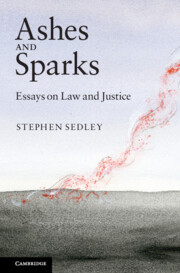Book contents
- Frontmatter
- Contents
- Preface
- Acknowledgements
- PART I History
- PART II Law
- PART III Justice
- 24 The right to know
- 25 The moral economy of judicial review
- 26 Policy and law
- 27 Responsibility and the law
- 28 The Crown in its own courts
- 29 Human rights – who needs them?
- 30 Fundamental values – but which?
- 31 Overcoming pragmatism
- 32 Sex, libels and video-surveillance
- 33 This beats me
- 34 Public inquiries: a cure or a disease?
- 35 Human rights: a twenty-first century agenda
- 36 Are human rights universal, and does it matter?
- 37 Bringing rights home: time to start a family?
- 38 The four wise monkeys visit the marketplace of ideas
- Index
35 - Human rights: a twenty-first century agenda
Published online by Cambridge University Press: 05 June 2012
- Frontmatter
- Contents
- Preface
- Acknowledgements
- PART I History
- PART II Law
- PART III Justice
- 24 The right to know
- 25 The moral economy of judicial review
- 26 Policy and law
- 27 Responsibility and the law
- 28 The Crown in its own courts
- 29 Human rights – who needs them?
- 30 Fundamental values – but which?
- 31 Overcoming pragmatism
- 32 Sex, libels and video-surveillance
- 33 This beats me
- 34 Public inquiries: a cure or a disease?
- 35 Human rights: a twenty-first century agenda
- 36 Are human rights universal, and does it matter?
- 37 Bringing rights home: time to start a family?
- 38 The four wise monkeys visit the marketplace of ideas
- Index
Summary
This paper, given as the 1995 Sieghart Memorial Lecture for the British Institute of Human Rights, marks my shift from scepticism to acceptance of the value of a domestic human rights instrument.
Lord Scarman, who chaired the lecture, summarised it in Heraclitus's words: ‘everything is in flux’. But while that is right, the essay may also be of interest as a proleptic look at what, three years later, became a legal reality.
The end of history seems a good moment to take stock. Fukuyama's conceit (I mean it in both senses) that the triumph of western liberalism has stopped the clock of change – has put an end to history – is already waning. We may reflect that human rights themselves have played a sacrificial role in this process, for the demise of the regimes of eastern Europe was accelerated by a megaphone rhetoric of human rights from states, including our own, with an embarrassing capacity for overlooking human rights abuses among their own allies and clients and even within their own frontiers. The message between the lines has been that human rights are a commodity like any other, capable of being traded for political or economic advantage, and the rhetoric little more than the conduct of politics by other means.
This is not, however, a complaint about the politicisation of human rights. They are by nature political, for they seek to condition how states treat individuals.
- Type
- Chapter
- Information
- Ashes and SparksEssays On Law and Justice, pp. 348 - 364Publisher: Cambridge University PressPrint publication year: 2011
- 1
- Cited by



